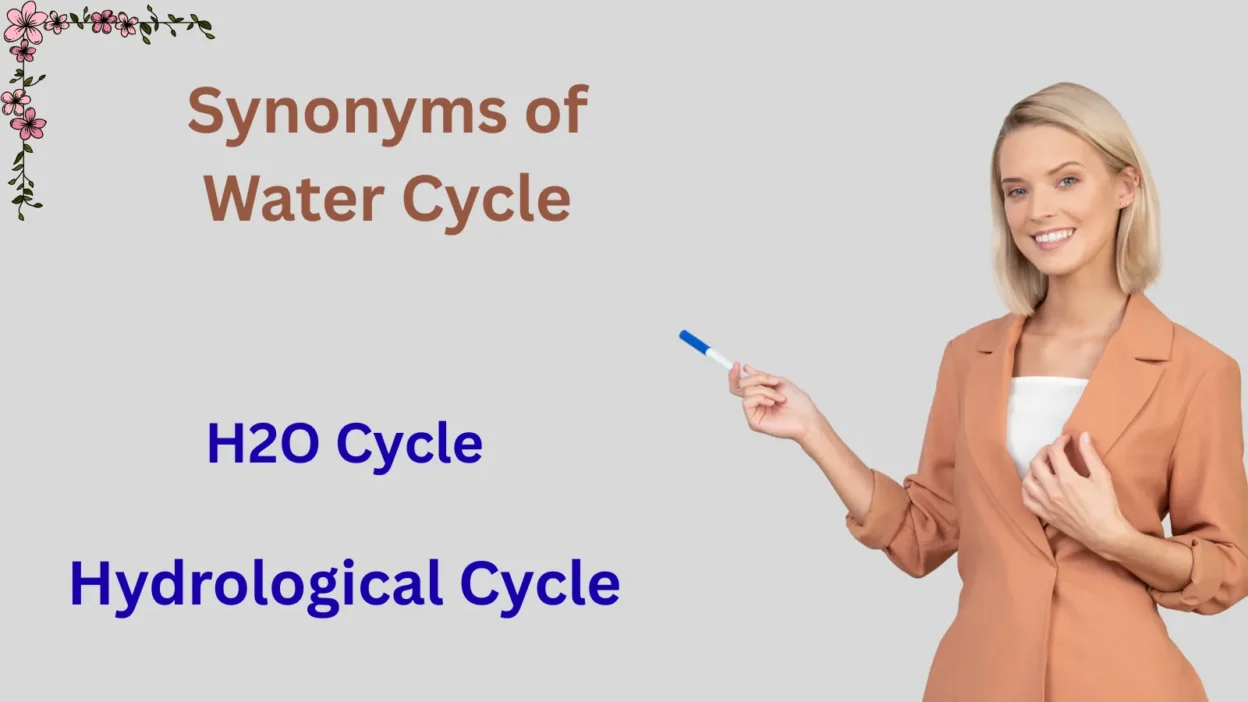Synonyms of water cycle, such as hydrological cycle, H2O cycle, and moisture cycle, highlight the scientific, natural, and educational perspectives of this vital process. For example, “hydrological cycle” is often used in academic or scientific contexts, while “moisture cycle” emphasizes the everyday movement of water in nature. Each synonym captures a unique way of understanding how water moves through our planet’s atmosphere, surface, and underground systems.
If you’re writing for a classroom, research paper, or even a simple nature blog, choosing the right synonym helps you match the tone and depth of your content. In this guide, we’ll explore a range of alternatives for the water cycle and discuss when each is best suited.
These synonyms of the water cycle not only improve your writing but also expand your appreciation for Earth’s natural balance. From rainfall to evaporation, the language around the water cycle is as dynamic as the process itself.
What Does the Water Cycle Mean?
The water cycle, also known as the hydrological cycle, is the continuous process in which water circulates between the atmosphere, land, and oceans. It involves key stages such as evaporation, condensation, precipitation, and collection, ensuring that water is constantly reused and redistributed throughout the Earth.
Depending on context, the term water cycle can evoke:
- Scientific precision – when used in academic or environmental studies.
- Natural wonder – when describing the beauty of rainfall, rivers, and clouds.
- Global importance – when highlighting climate, ecosystems, or sustainability.
- Everyday learning – when teaching kids how rain and evaporation work.
25 Synonyms of Water Cycle with Usage Guidance
1. Hydrological Cycle
Meaning: The scientific term for the water cycle.
Example: “The hydrological cycle explains how rainfall replenishes rivers and lakes.”
Use When: Writing in scientific or academic contexts.
2. H2O Cycle
Meaning: A simplified, modern way to refer to the water cycle.
Example: “Students learned about the H2O cycle in their science class.”
Use When: Informal or educational contexts.
3. Evaporation-Condensation Cycle
Meaning: Highlights the key processes of the water cycle.
Example: “The evaporation-condensation cycle drives cloud formation.”
Use When: Focusing on specific stages in science explanations.
4. Rainfall Cycle
Meaning: Emphasizes precipitation within the water cycle.
Example: “The rainfall cycle affects local agriculture every season.”
Use When: Discussing weather patterns or farming.
5. Precipitation Cycle
Meaning: Focuses on the process of water returning to Earth.
Example: “Scientists study the precipitation cycle to predict floods.”
Use When: Weather and environmental studies.
6. Condensation-Evaporation Process
Meaning: Describes water vapor forming clouds and returning as liquid.
Example: “The condensation-evaporation process is crucial for cloud formation.”
Use When: Teaching or emphasizing physical processes.
7. Rain Cycle
Meaning: Simplified term emphasizing rainfall.
Example: “The rain cycle helps refill natural reservoirs.”
Use When: Educational or casual discussions.
8. Water Movement Cycle
Meaning: Highlights water’s motion through different phases.
Example: “The water movement cycle connects rivers, lakes, and oceans.”
Use When: Discussing hydrology or environmental flow.
9. Liquid-Vapor Cycle
Meaning: Focuses on the transition between liquid and gas states.
Example: “The liquid-vapor cycle explains why humidity rises in summer.”
Use When: Scientific, chemistry, or physics-focused contexts.
10. Environmental Water Cycle
Meaning: Emphasizes the ecological aspect of the cycle.
Example: “The environmental water cycle supports plant and animal life.”
Use When: Environmental science and conservation topics.
11. Aquatic Cycle
Meaning: Highlights the role of water in ecosystems.
Example: “The aquatic cycle is vital for maintaining river health.”
Use When: Ecology or biology contexts.
12. Rainwater Cycle
Meaning: Focuses on the journey of rainwater specifically.
Example: “The rainwater cycle replenishes groundwater sources.”
Use When: Environmental management or water conservation.
13. Natural Water Cycle
Meaning: Emphasizes the cycle as a natural phenomenon.
Example: “The natural water cycle has operated for millions of years.”
Use When: General education, nature writing, or environmental discussions.
14. Moisture Cycle
Meaning: Focuses on moisture moving through air and land.
Example: “The moisture cycle affects local climate patterns.”
Use When: Climate science or meteorology.
15. Hydrocycle
Meaning: A condensed term for the water cycle.
Example: “Understanding the hydrocycle is key to water management.”
Use When: Scientific writing or informal shorthand.
16. Water Circulation
Meaning: Highlights the movement aspect of water.
Example: “Ocean currents are part of global water circulation.”
Use When: Physical geography or environmental science.
17. Precipitation-Evaporation Loop
Meaning: Focuses on the repeating nature of the water cycle.
Example: “The precipitation-evaporation loop ensures water is constantly recycled.”
Use When: Educational or explanatory contexts.
18. Surface Water Cycle
Meaning: Highlights water movement on Earth’s surface.
Example: “The surface water cycle includes rivers, lakes, and runoff.”
Use When: Geography or hydrology discussions.
19. Atmospheric Water Cycle
Meaning: Focuses on water moving through the atmosphere.
Example: “The atmospheric water cycle drives cloud formation and rainfall.”
Use When: Meteorology or climate studies.
20. Ecohydrological Cycle
Meaning: Combines ecological and hydrological perspectives.
Example: “The ecohydrological cycle impacts both forests and rivers.”
Use When: Environmental science and research.
21. Water Recycling Process
Meaning: Describes water moving through natural cycles.
Example: “The water recycling process supports life on Earth.”
Use When: Emphasizing sustainability or education.
22. Hydrosphere Cycle
Meaning: Encompasses all water movement within the Earth’s hydrosphere.
Example: “The hydrosphere cycle is a fundamental concept in Earth science.”
Use When: Advanced academic or geological writing.
23. Liquid Cycle
Meaning: Focuses on water in its liquid form.
Example: “Rivers, lakes, and oceans are part of the liquid cycle.”
Use When: Simplified explanation or primary education.
24. Evapotranspiration Cycle
Meaning: Includes evaporation and plant transpiration.
Example: “The evapotranspiration cycle is crucial for agriculture.”
Use When: Environmental science, agriculture, or forestry contexts.
25. Global Water Cycle
Meaning: Emphasizes the worldwide scale of water movement.
Example: “The global water cycle affects climates across continents.”
Use When: Climate science, global studies, or Earth science.
Choosing the Right Synonym Based on Context
- Scientific & Academic Writing: Use hydrological cycle, hydrocycle, atmospheric water cycle, or hydrosphere cycle.
- Educational Contexts: Use the H2O cycle, the rain cycle, or the liquid cycle.
- Environmental & Sustainability Writing: Use the eco-hydrological cycle, the environmental water cycle, or the water recycling process.
- Focus on Specific Stages: Use evaporation-condensation cycle, precipitation-evaporation loop, or evapotranspiration cycle.
Cultural & Emotional Note: Terms like rainfall cycle or moisture cycle are more accessible to the general public and evoke everyday natural experiences, while hydrological cycle or hydrosphere cycle resonate more in academic or technical contexts.
Conclusion
The water cycle is more than just a scientific term—it’s a story of movement, balance, and renewal. By exploring synonyms like hydrological cycle, moisture cycle, or even H2O cycle, you can highlight different aspects of this essential process depending on your audience. If you’re writing for students, scientists, or casual readers, the right synonym brings clarity and depth to your work.
Each alternative term sheds light on how water connects the Earth’s systems, from clouds drifting across the sky to rivers flowing into the sea. Using these synonyms not only enriches your vocabulary but also helps capture the wonder and importance of one of nature’s most vital cycles.
In the end, the synonyms of water cycle remind us that while words may differ, the meaning remains the same: water is always on the move, sustaining life everywhere.





